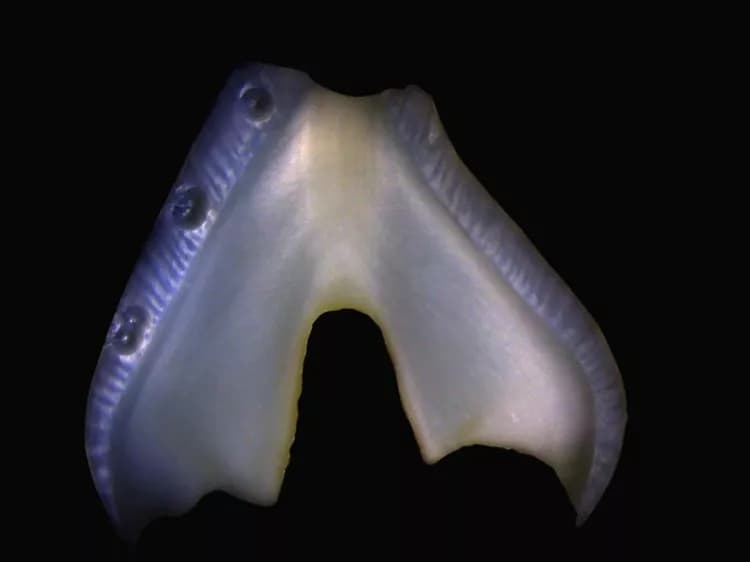
The Secrets Of Tooth Calcium Revealed
Two studies on calcium isotopes in teeth have provided new insights into both the extinction of the marine reptiles and weaning age in humans. The findings of these studies, conducted by CNRS researchers at Lyon ENS and Université Claude Bernard Lyon, were published, respectively, on 25 and 30 May 2017 in Current Biology and PNAS. They open new avenues for research in anthropology and paleontology.
A new method for measuring proportions of stable calcium isotopes has just been developed by a team of geochemists, in particular involving the Laboratoire de géologie de Lyon: Terre, planètes et environnement (ENS Lyon/CNRS/Université Claude Bernard Lyon 1). This high precision method allows new scientific advances in all kinds of domains, such as estimating weaning age in humans from milk teeth or finding a new explanation for the extinction of marine reptiles.
Calcium is the main constituent of our bones and teeth. There are six stable isotopes of this element on Earth. These isotopes do not generate natural radioactivity, but make it possible to identify chemical reactions through their specific signatures, which are formed by the fractionation of the different calcium isotopes during biological processes and are all the more marked in bones and teeth. The method used by the researchers is therefore to analyze the degree of isotopic fractionation in these tissues.
Breast milk is the substance in which calcium isotopes are most fractionated. Thus, by analyzing milk teeth, it is possible to trace someone's diet in the early years of their life. The more milk in the diet, the more the dental calcium contains light isotopes. By cutting into milk teeth and measuring isotopic ratios using a mass spectrometer, the researchers observed that teeth begin mineralization with very considerable isotopic differences and that these values maintain stable proportions until weaning. By knowing the speed at which tooth enamel is formed, researchers have been able to develop a way to estimate weaning age in our ancestors. Their results were published on 30 May 2017 in PNAS. This new method could allow anthropologists to better understand hominid community structures.
In another field, isotopic analysis of dental calcium allowed researchers to show that on the eve of the extinction of the dinosaurs, large marine reptiles were at the top of the marine food chain. This study, published on 25 May 2017 in Current Biology, suggests that this competitive situation could be the reason for their disappearance, as a result of the scarcity of their shared source of food. In a previous study in 2015, CNRS researcher Vincent Balter and his colleagues had already noticed that the proportions of stable calcium isotopes in the tooth calcium of marine animals varied progressively from the bottom to the top of the food chain. The researchers analyzed the proportions of stable calcium isotopes in fish teeth, turtle shells, sharks and marine reptiles from a paleontological site in Morocco. Fossils over 65 million years old were chemically treated before analysis to avoid bias caused by fossilization. The research team was able to show that fish, turtles and sharks had the same proportions of stable calcium isotopes as they do today. On the contrary, large marine reptiles (elasmosaurs and mosasaurs) had proportions characteristic of today's large white sharks, and were therefore at the top of the marine food chain before their extinction.
Materials provided by CNRS (Délégation Paris Michel-Ange). Note: Content may be edited for style and length.
Disclaimer: DoveMed is not responsible for the accuracy of the adapted version of news releases posted to DoveMed by contributing universities and institutions.
Primary Resource:
- Martin, J. E., Vincent, P., Tacail, T., Khaldoune, F., Jourani, E., Bardet, N., & Balter, V. (2017). Calcium Isotopic Evidence for Vulnerable Marine Ecosystem Structure Prior to the K/Pg Extinction. Current Biology. DOI: 10.1016/j.cub.2017.04.043
- Tacail, T., Thivichon-Prince, B., Martin, J. E., Charles, C., Viriot, L., & Balter, V. (2017). Assessing human weaning practices with calcium isotopes in tooth enamel. Proceedings of the National Academy of Sciences, 201704412. DOI: 10.1073/pnas.1704412114
Related Articles
Test Your Knowledge
Asked by users
Related Centers
Related Specialties
Related Physicians
Related Procedures
Related Resources
Join DoveHubs
and connect with fellow professionals

0 Comments
Please log in to post a comment.